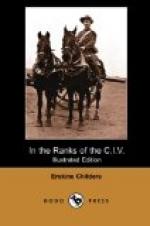Abrupt contrasts to the rough camp life were some evenings spent with Williams in Capetown, where it already felt very strange to be dining at a table, and sitting on a chair, and using more than one plate. Once it was at the invitation of Amery of the Times, in the palatial splendour of the Mount Nelson Hotel, where I felt strangely incongruous in my by no means immaculate driver’s uniform. But how I enjoyed that dinner! Had there been many drivers present, the management would have been seriously embarrassed that evening.
Wildly varying rumours of our future used to abound, but on March 14, a sudden order came to raise camp, and march to Stellenbosch. Teams were harnessed and hooked in, stores packed in the buck waggons, tents struck, and at twelve we were ready. Before starting Major McMicking addressed us, and said we were going to a disaffected district, and must be very careful. We took ourselves very seriously in those days, and instantly felt a sense of heightened importance. Then we started on the road which by slow, very slow, degrees was to bring us to Pretoria in August.
My preparations had been very simple, merely the securing of a blanket over the roan’s distressingly bony spine, and putting a bit in his refractory mouth. As I anticipated, there had been a crisis over my lack of a saddle at the last moment, various officers and N.C.O.’s laying the blame, first on me (of all people), and then on each other, but chiefly on me, because it was safest. Not having yet learnt the unquestioning attitude of a soldier, I felt a great martyr at the time. The infinite insignificance of the comfort on horseback of one spare driver had not yet dawned upon me; later on, I learnt that indispensable philosophy whose gist is, “Take what comes, and don’t worry.”
We passed through Capetown and its interminable suburbs, came out on to open rolling country, mostly covered with green scrub, and, in the afternoon, formed our first regular marching camp, on a bit of green sward, which was a delicious contrast after Green Point Sand. Guns and waggons were marshalled, picket-ropes stretched between them, the horses tied up, and the routine of “stables” begun again.
It was our first bivouac in the open, and very well I slept, with my blanket and waterproof sheet, though it turned very cold about two with a heavy dew. A bare-backed ride of thirteen miles had made me pretty tired.
The next day we were up at five, for a march of eighteen miles to Stellenbosch. At mid-day we passed hundreds of re-mount ponies, travelling in droves, with Indian drivers in turbans and loose white linen. Half-way we watered our horses and had a fearful jostle with a Yeomanry corps (who were on the march with us), the Indians, and a whole tribe of mules which turned up from somewhere. In the afternoon we arrived at our camp, a bare, dusty hill, parching under the sun.
We passed a week here, drilling and harness cleaning, in an atmosphere of dust and never-ending rumours.




